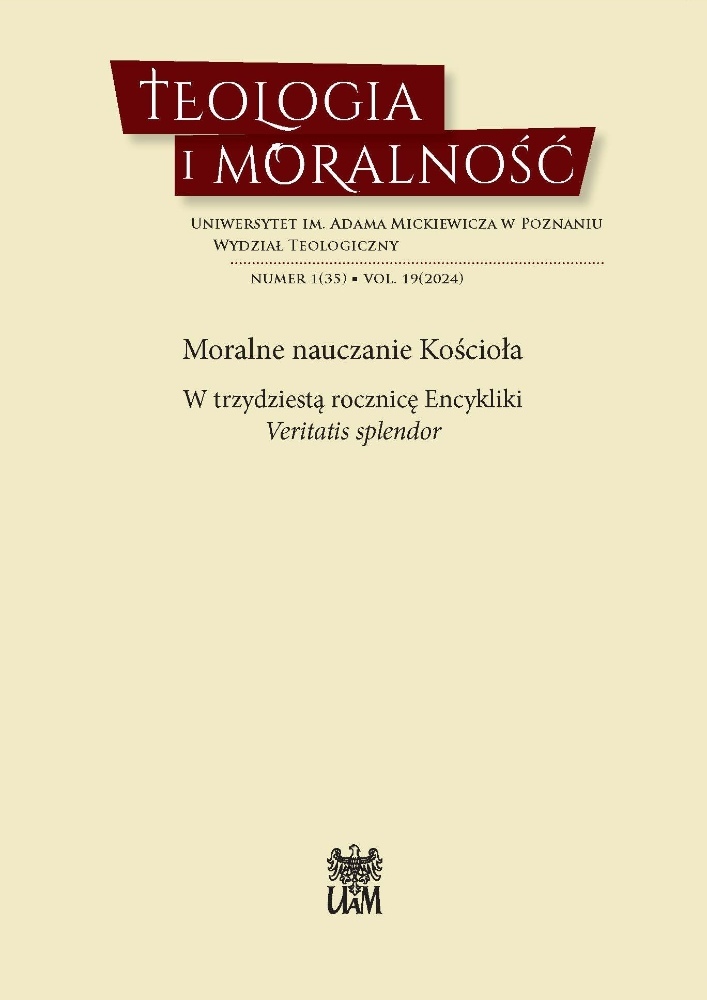Abstract
The theory of “fundamental option” or “fundamental freedom” constitutes an important theme in contemporary moral theology, a theme criticized in John Paul II’s encyclical Veritatis Splendor. Under this theory, it is almost impossible for a person to commit a mortal sin, that is, a sin that turns the agent against God and deprives him of sanctifying grace. This central conception governing this theory is that such a sin must involve an ex-press turning of one’s entire self (or will) away from God. However, within the limitations of space and time and the finitude of human nature, such a complete turning against God is diffi cult to conceive. This paper argues that the issue of sin is misconceived and that the philosophical premise of a fundamental disposition of one’s freedom is not tenable. Sin is a theological category and must be grasped in theological terms. The paper turns to Pope Saint John Paul II’s Encyclical Dominum et Vivifi cantem, which proposes that sin is revealed by and properly understood in terms of the crucifi xion of Christ. The paper concludes with some reflections on those who were directly involved in the crucifixion.
References
Aquinas, Thomas. 1952. Summa Theologiae. Great Books of the Western World. Translated by Fathers of the English Dominican Province. Vols. 19-20. Chicago, London, Toronto: Encyclopedia Britannica.
Aristotle. 1988. Nicomachean Ethics. Translated by David Ross and Revised by J.L. Ackrill and J.O. Urmson. New York: Oxford University Press.
Auden, W.H. 1954. “September 1, 1939.” In: The Major Poets: English and American, by Charles M. Coffin (Editor), 518-520. New York: Harcourt, Brace & World.
Francis. 2022. “Discorso del Santo Padre Francesco ai Participanti al Convegno Internazionale di Teologia Morale.” The Holy See. May 13. Accessed October 2023. https://www.vatican.va/content/francesco/it/speeches/2022/may/documents/20220513-convegno-teologia-morale.html.
Fuchs, Joseph. 1990. “Good Acts and Good Persons.” In: John Paul II and Moral Theology: Readings in Moral Theology No. 10, by Charles E Curran and Richard A McCormick, 47-51. New York/Mahwah, NJ: Paulist.
John Paul II. 1981. Encyclical Laborem Exercens. Vatican City: Libreria Editrice Vaticana.
John Paul II. 1986. Encyclical „Dominum et Vivifi cantem”. Vatican City: Libreria Editrice Vaticana.
John Paul II. 1993. Encyclical: „Veritatis Splendor”. Vatican City: Libraria Editrice Vaticana.
John Paul II. 1995. Encyclical „Evangelium vitae”. Vatican City: Libreria Editrice Vaticana.
McCormick, SJ, Richard A. 1989. The Critical Calling: Reflections on Moral Dilemmas since Vatican II. Washington, D.C.: Georgetown University Press.
Plato. 1961a. “Republic.” In: The Collected Dialogues of Plato, by Plato, edited by Edith Hamilton and Huntington Cairns, translated by Paul Shorey, 575-844. Princeton: Princeton University Press. DOI: https://doi.org/10.1515/9781400835867-020
Plato. 1961b. “Symposium.” In: The Collected Dialogues of Plato, by Plato, edited by Edith Hamilton and Huntngton Cairns, 526-574. Princeton: Princeton University Press. DOI: https://doi.org/10.1515/9781400835867-019
Vatican Council II. 1965. „Gaudium et spes”: Pastoral Constitution on the Church in the Modern World. Boston: Pauline Books & Media.
Wojtyła, Karol. 1993. “Thomistic Personalism.” In: Person and Community: Selected Essays, by Karol Wojtyła, translated by Theresa Sandok, 167-175. New York, San Francisco: Peter Lang.
Wojtyła, Karol. 2013. Love and Responsibility. Translated by Grzegorz Ignatik. Boston: Pauline Books & Media.
Wojtyła, Karol. 2021. Person and Act. Vol. 1, in: Person and Act and Related Essays, by Karol Wojtyła, translated by Grzegorz Ignatik, 95-416. Washington, D.C.: The Catholic University of America Press. DOI: https://doi.org/10.2307/j.ctv1khdqkj
License
Copyright (c) 2024 Adrian J. Reimers

This work is licensed under a Creative Commons Attribution 4.0 International License.

